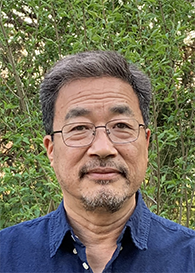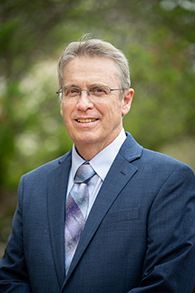K-State honors faculty with university distinguished professor title
Wednesday, April 17, 2024

Kansas State University has honored three professors with the prestigious lifetime title of university distinguished professor. From left: Traci Brimhall, professor of English; Yoonseong Park, professor of entomology; and James Stack, professor of plant pathology.
MANHATTAN — Kansas State University has honored three professors with the title of university distinguished professor, the highest faculty title given by the university.
The 2024 recipients of this lifetime honor are Traci Brimhall, professor of English; Yoonseong Park, professor of entomology; and James Stack, professor of plant pathology.
"Drs. Brimhall, Park and Stack are distinguished leaders in their respective fields," said Debbie Mercer, interim provost and executive vice president. "Their excellence in teaching, service, research and scholarly activity supports K-State's efforts to lead the nation as a next-generation land-grant university."
University distinguished professors are appointed following a universitywide nomination and evaluation process conducted by the provost. The three faculty members receive a personalized plaque and medallion at the university's fall 2024 commencement ceremonies.
Traci Brimhall, English department
Brimhall, the current Kansas poet laureate, is a nationally recognized poet and nonfiction writer. Her creative and scholarly work includes authoring five poetry collections, more than 100 individual published poems and essays and more than 150 readings.
Her poetry has appeared in prestigious journals and national publications, including Ploughshares, New England Review, American Poetry Review, The New Yorker, The New York Times and The Nation. Brimhall has given public poetry readings across the U.S. and internationally, including the Folger Shakespeare Library in Washington, D.C., the Bowery Poetry Club in New York City and the American Library in Paris, France.
As an educator, Brimhall is the director of K-State's creative writing program and teaches undergraduate and graduate-level writing courses. She is known as an innovative and influential educator who regularly integrates student learning with everyday life experiences. Her numerous recognitions for teaching include the English department's Donnelly Award for Faculty Excellence, SAGE Excellence in Teaching Award and the Outstanding Teaching Award; the College of Arts and Sciences Ron Gaches Undergraduate Teaching Award; and the Kansas State Book Network Common Read Faculty/Staff Award.
Appointed in 2023 to a four-year term as the poet laureate of Kansas, Brimhall travels throughout the state, giving talks and hosting classes on poetry. As poet laureate, Brimhall focuses on the relationship between food and poetry, and her talks often include food drives to help address food insecurity. She also serves as poetry editor for KANSAS magazine and emcee for the Kansas Poetry Out Loud competition.
Additional accolades include the prestigious Cecil Hemley Memorial Award from the Poetry Society of America, the Pushcart Prize for best poem published in small presses, the Barnard Women Poets Prize, the Crab Orchard Series in Poetry First Book Award and the Jane Geske Award from Prairie Schooner. Brimhall was also awarded the National Endowment for the Arts Literature Fellowship in Poetry in 2012 and the National Parks Service Artist-in-Residence in May 2023.
Brimhall earned a bachelor's degree from Florida State University, a master's degree from Sarah Lawrence College and a doctorate in poetry/literature from Western Michigan University.
Yoonseong Park, entomology department
Park is one of the most renowned international research leaders in insect molecular physiology, focusing on insect and other arthropod pest species. His research has led to the discovery and application of neuropeptide signaling systems in arthropods, including the new theory of "Pleiotropic ligand-receptor interactions in the evolution of neuropeptide functions." Most notably, Park studied tick salivary excretions to advance the understanding of Alpha-gal syndrome, or red meat allergy, and developed a honeybee-safe acaricide — a pesticide that kills ticks and mites.
Awarded more than $24 million in research funding, Park has published more than 130 peer-reviewed publications in journals including Proceedings of the National Academy of Sciences, Pathogens, Insect Biochemistry and Molecular Biology, Insects, Scientific Reports and Nature. He has given nearly 100 invited presentations and has contributed to more than 160 presentations and abstracts. Park holds two patents for his innovative work.
He has also made a significant contribution to graduate education at K-State. Park has taught several graduate courses and developed the Molecular Insect Techniques course, which he also teaches. He has mentored 10 postdoctoral fellows, nine visiting scientists and 19 graduate students, and he has advised more than 40 undergraduate students. In 2023, Park received the 2022-2023 Commerce Bank and W.T. Kemper Foundation Distinguished Graduate Faculty Award. Other awards include the K-State College of Agriculture Excellence in Graduate Teaching Award and the Entomology Popenoe Club Faculty of the Year.
Park has served on the editorial board or as section editor for eight international journals. He was an ad hoc reviewer for more than 470 manuscripts and more than 200 grant proposals, and he organized more than 10 international and national symposia. His commitment to service also extends to the university through his involvement in multiple committees and programs.
Park joined K-State in 2002 and earned a bachelor's degree in agricultural biology from Chonbuk National University in Korea, a master's degree in entomology from the University of California, Riverside, and a doctorate in insect science from the University of Arizona.
James Stack, plant pathology department
Stack is a global leader in plant pathogen diagnostics and biosecurity research and policy. He focuses on rapid detection, diagnosis and response to foreign pathogens threatening economic and global food security.
An eminent scientist, Stack was instrumental in developing the National Plant Diagnostic Network, a consortium of diagnostic labs in the U.S. and its territories to protect plant health through timely diagnostics of plant pests and pathogens. Stack is the director of the network's regional Great Plains Diagnostic Network. Additionally, he was a member of the scientific advisory team for the National Plant Disease Recovery System, an effort of the U.S. Department of Agriculture – Agriculture Research Service to mitigate high-consequence plant disease breakouts.
Stack served as the first director of K-State's Biosecurity Research Institute and oversaw its transition from a construction project to a research institute. He continues to conduct research at the facility. Since joining K-State, Stack has been awarded nearly $11 million in research funding. Notably, Stack developed pathway analyses and diagnostics for Rathayibacter toxicus, a deadly toxin-producing bacterial pathogen in grasses responsible for substantial livestock death in Australia. Additionally, he developed wheat blast diagnostics to define detection limits in wheat seed, resulting in the ability to track pathogen movement through grain trade, as part of a collaborative wheat blast research project.
Stack teaches a graduate-level plant pathology course and an annual one-week short course he developed, Plant Biosecurity in Theory and Practice, with more than 140 participants from 17 countries. Stack has mentored 23 graduate students, postdoctoral researchers, two Fulbright Scholars and industry professionals. The American Society of Agronomy recognized Stack for outstanding agronomic educational material. He earned the Science Impact Award from the Plant Biosecurity Cooperative Research Centre in Australia and is a fellow of the American Phytopathological Society.
As a leading plant health and biosecurity expert, Stack has given more than 70 invited presentations, testified to White House panels and the Bipartisan Commission on Biodefense, and addressed the National Academies of Science and the FBI. Additionally, Stack has authored 78 peer-reviewed publications and book chapters, 57 abstracts and conference proceedings, and 16 extension publications. Stack holds a bachelor's and master's degree in plant pathology from the University of Massachusetts and a doctorate from Cornell University.



